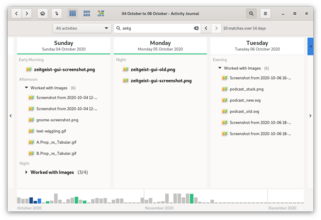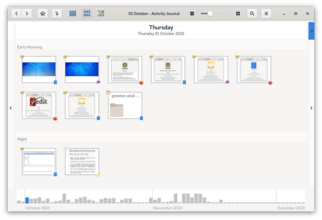 | |
| Developer(s) | GNOME Activity Journal developers |
|---|---|
| Initial release | 20 January 2010; 14 years ago (2010-01-20) |
| Stable release | 1.0.0 / 1 February 2021; 3 years ago (2021-02-01) |
| Preview release | none |
| Repository | |
| Written in | Python |
| Platform | GNOME |
| License | GNU General Public License v3 and Creative Commons - Attribution Share Alike |
| Website | wiki |
GNOME Activity Journal is a semantic desktop browser-like application for the GNOME desktop environment. Instead of providing direct access to the hierarchical file system like most file managers, GNOME Activity Journal uses the Zeitgeist framework to classify files according to metadata. This includes time and date of previous accesses, location of use (using GPS positioning), file type, tagging and more. In addition to local files, GNOME Activity Journal also organizes web browsing history, email and other data sources.
GNOME Activity Journal was ported to GTK3 and Python3 in version 1.0.0. It is available as part of Debian, Fedora, Arch Linux (AUR) and Ubuntu.
History
GNOME Activity Journal's inclusion in GNOME 3.0 was initially rejected with the provided reason being that it did not integrate well in the whole desktop and looked more like a standalone application, but that decision was revisited at the GNOME Boston Summit and integration with GNOME is once again planned.
Ubuntu shipped Zeitgeist as a standard part of their new desktop environment, Unity, in Ubuntu 11.04. Gnome Activity Journal is not shipped by default, but the Unity Dash makes use of Zeitgeist.
Screenshots
See also
References
- "Versions for gnome-activity-journal". Repology.
- Vincent Untz. "New module decisions for 3.0". Archived from the original on 25 April 2014. Retrieved 13 April 2011.
- Federico Mena Quintero. "Federico Mena Quintero - November 2010 Activity Log". Archived from the original on 27 May 2011.
- Tony Mobily (6 November 2010). "Ubuntu embraces Unity and Wayland. Or, GNU/Linux is exciting again". Free Software Magazine. Archived from the original on 9 November 2010. Retrieved 6 November 2010.
- Ryan Paul (26 October 2010). "Shuttleworth: Unity shell will be default desktop in Ubuntu 11.04". Ars Technica. Retrieved 6 November 2010.
- "Details of package zeitgeist in natty". Ubuntu. 2011. Retrieved 5 May 2011.
External links
| GNOME | |||||||||||||||||
|---|---|---|---|---|---|---|---|---|---|---|---|---|---|---|---|---|---|
| Core Applications | |||||||||||||||||
| Extras |
| ||||||||||||||||
| Components |
| ||||||||||||||||
| Community | |||||||||||||||||
| People | |||||||||||||||||


